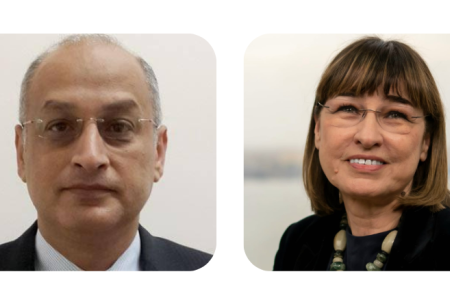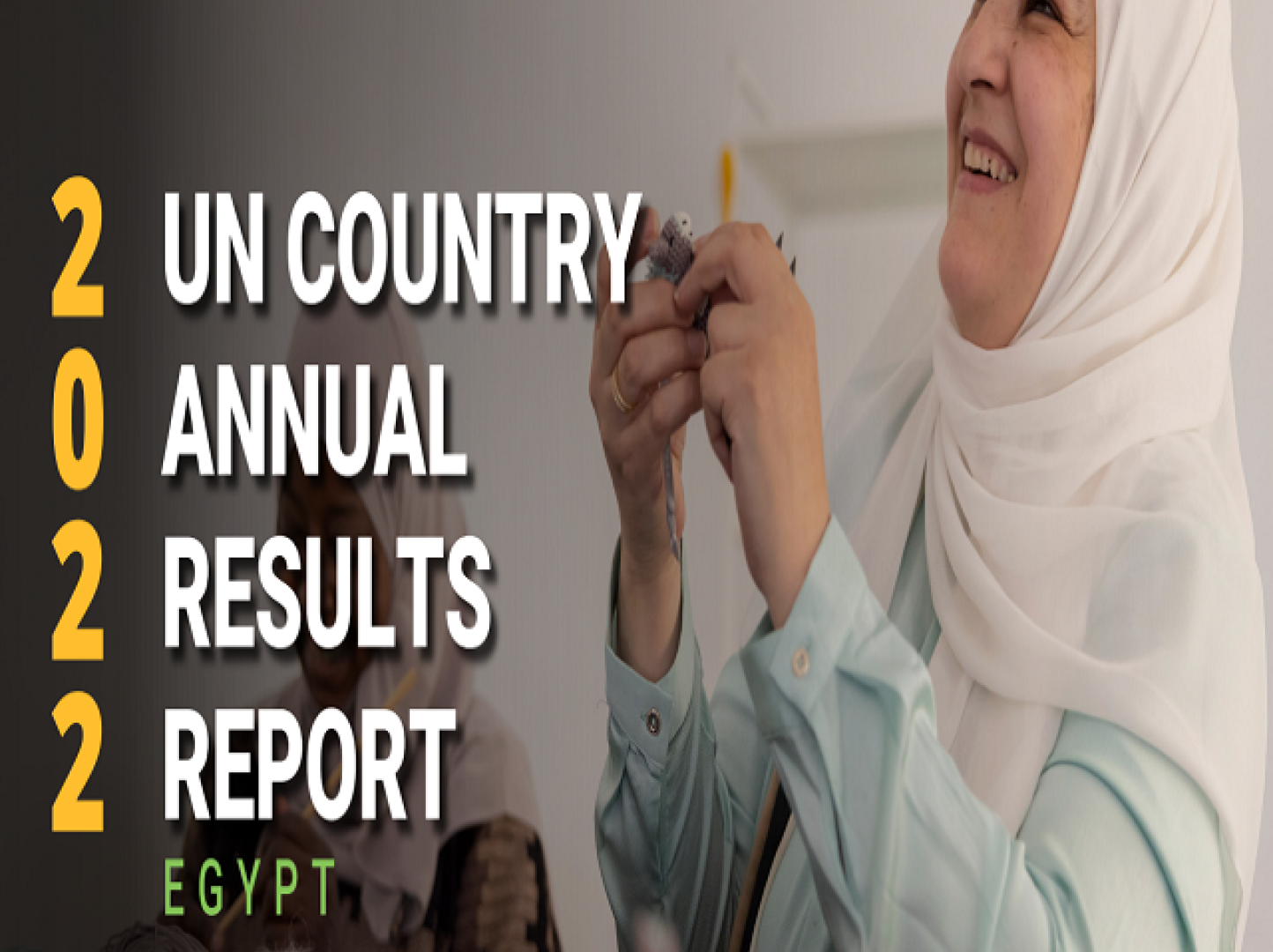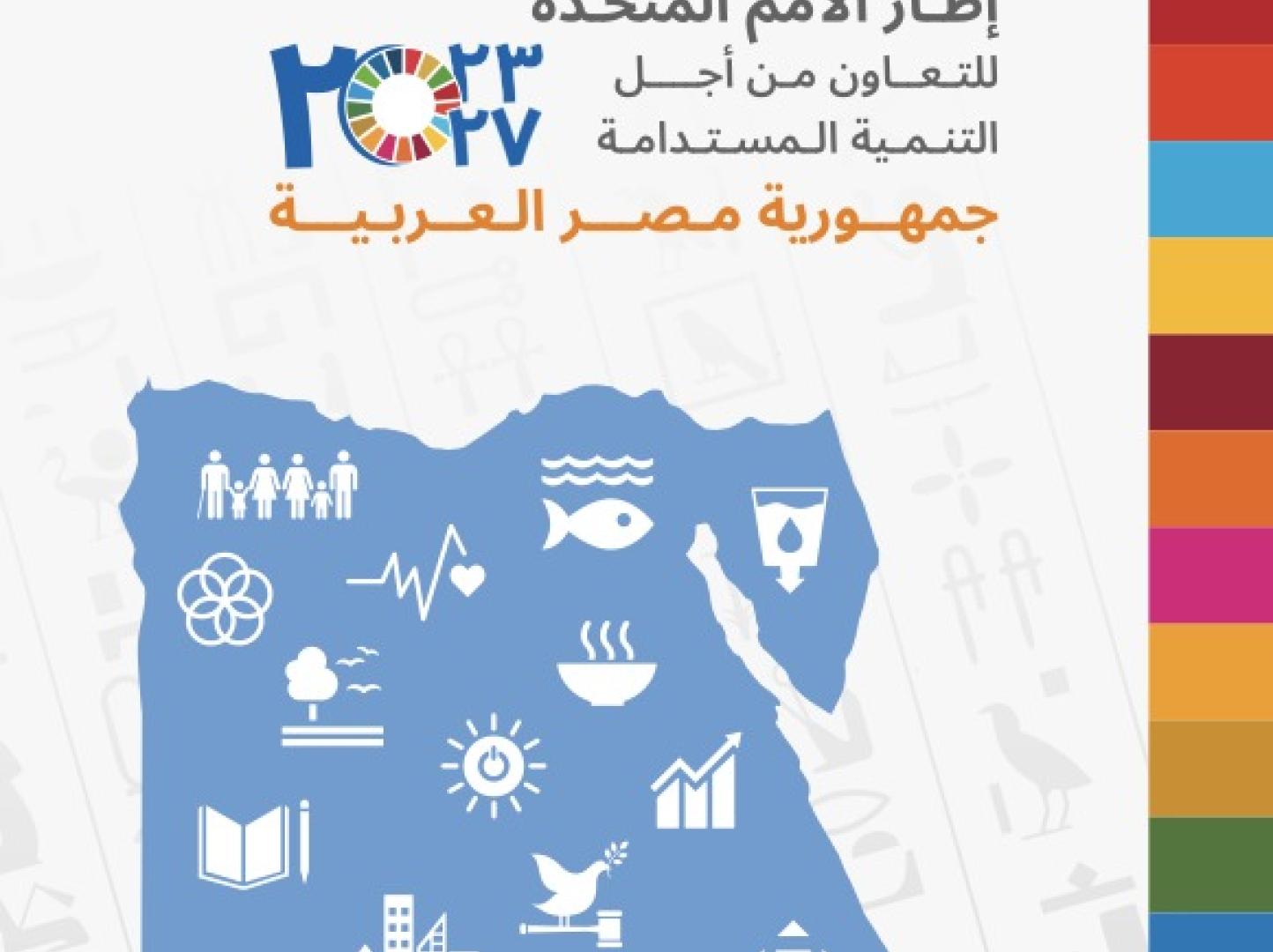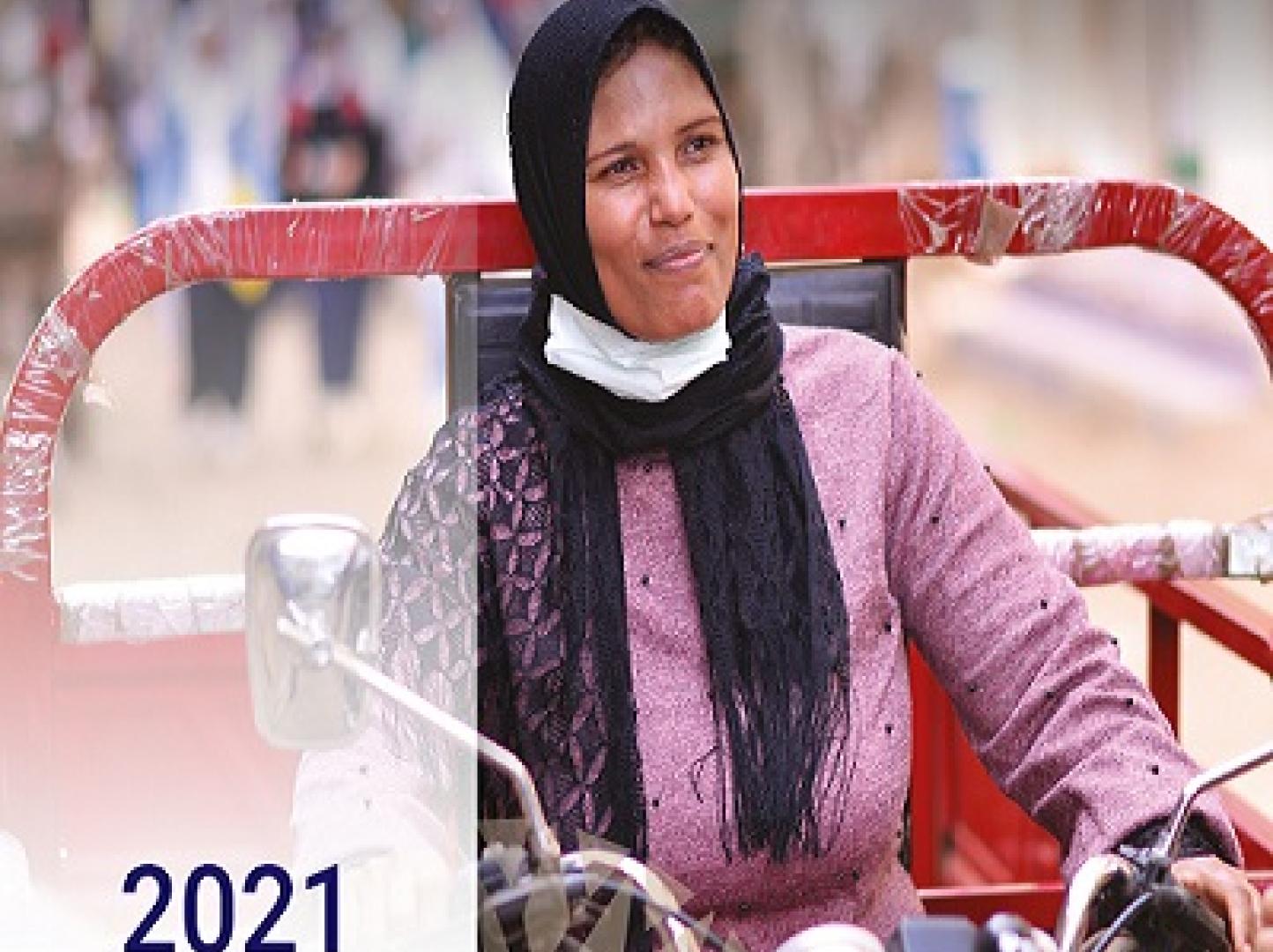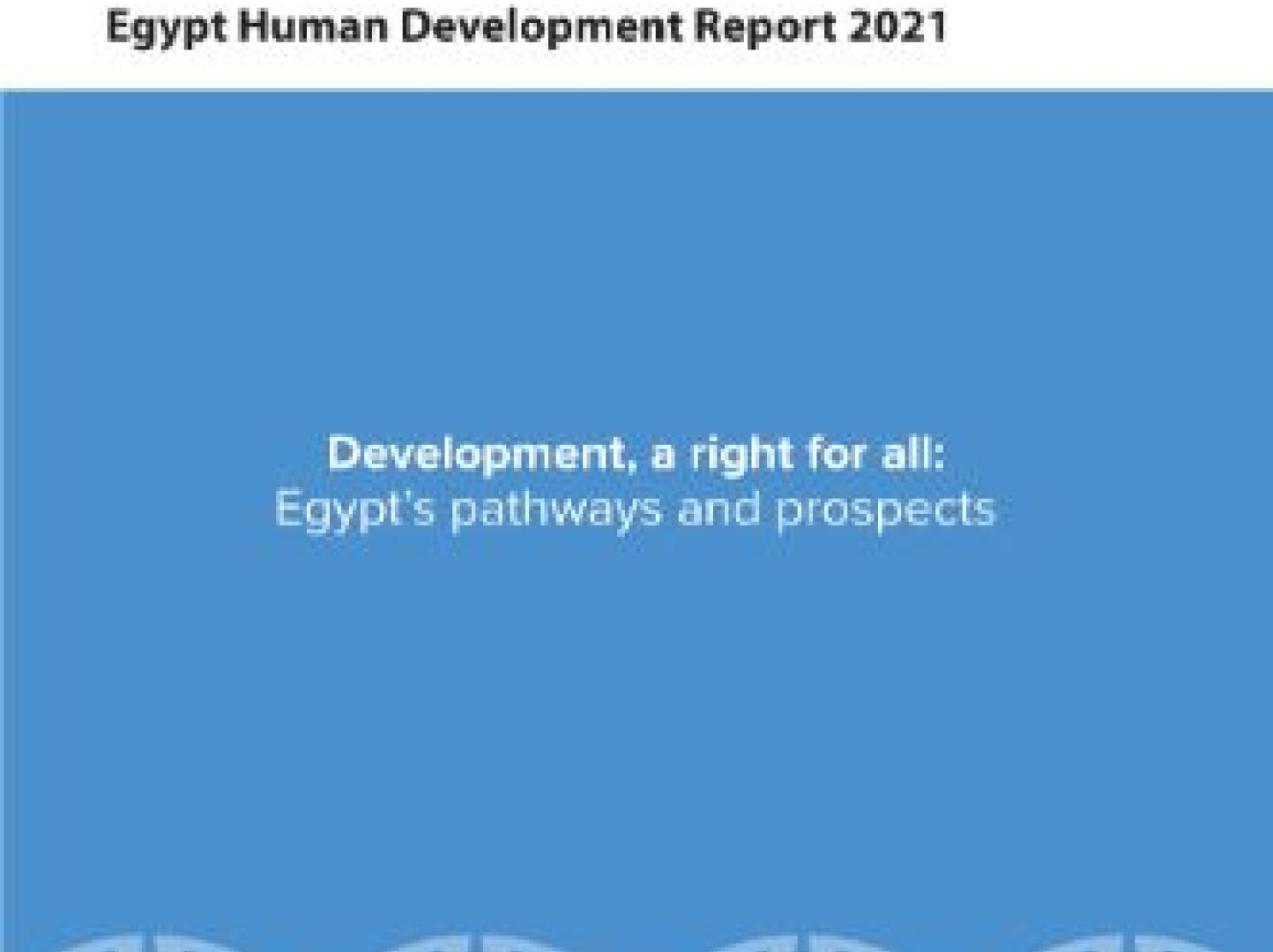Latest
Press Release
25 November 2025
The Secretary-General -- Message on The International Day For The Elimination Of Violence Against Women 25 November 2025
Learn more
Press Release
20 November 2025
THE SECRETARY-GENERAL -- VIDEO MESSAGE ON WORLD CHILDREN’S DAY 20 November 2025
Learn more
Press Release
25 October 2025
UN Convention against Cybercrime opens for signature in Hanoi, Viet Nam
Learn more
Latest
The Sustainable Development Goals in Egypt
The Sustainable Development Goals are a global call to action to end poverty, protect the earth’s environment and climate, and ensure that people everywhere can enjoy peace and prosperity. These are the goals the UN is working on in Egypt:
Video
06 February 2025
Sustainable Development Goals in the Spotlight as UN Egypt makes debut participation at the Cairo International Book Fair
For the first time, the UN Egypt family participated in the Cairo International Book Fair, one of the most significant and influential book fairs in the Middle East.Throughout the event, the UN in Egypt's booth welcomed visitors of all age groups, offering them a chance to explore a selection of key UN and international publications and reports available at the UN Information Center in Cairo’s library—one of the oldest and most prominent libraries of its kind in the region.The UN Egypt booth also provided visitors with a diverse range of printed publications, digital materials, and videos aimed at raising awareness and sharing success stories, all highlighting the UN’s impactful contributions and its partnership with the Egyptian government to advance the Sustainable Development Goals (SDGs).These resources reflect the collective efforts of various UN agencies in Egypt, including UNICEF, FAO, UNHCR, WFP, ILO, IOM, UNFPA, OCHA, UN-Habitat, UNV, UN Women, and UNRWA.Moreover, UN Egypt booth curators and communication officials engaged in insightful, SDG-focused discussions with the visitors, along with other interactive awareness raising activities designed for visiting children. Additionally, young people had the opportunity to learn about UN volunteering opportunities and the application process.
1 of 3

Story
06 November 2024
WUF12: Egypt’s National Initiative for Smart Green Projects highlighted as model for localizing climate action and promoting sustainable urbanization
As part of the Twelfth Session of the World Urban Forum (WUF12) in Cairo, a high-level session highlighted Egypt’s National Initiative for Smart Green Projects (Egypt SGP) as a leading model for localizing climate action and promoting sustainable urban development through local solutions and innovations.The session was moderated by Ambassador Hisham Badr, the National Coordinator of the initiative, and attended by Dr. Rania Al-Mashat, Minister of Planning, Economic Development, and International Cooperation; Michal Mlynár, Deputy Executive Director of UN-Habitat; Elena Panova, UN Resident Coordinator in Egypt; and Alessandro Fracassetti, UNDP Resident Representative in Egypt. Speakers at the session emphasized the need to scale up successful projects like the National Initiative for Smart Green Projects to achieve a broader global impact, with Minister Mashat emphasizing the significance of multi-sector collaboration to ensure that sustainable solutions are scalable and aligned with global climate goals.Mr. Mlynár commended Egypt SGP as reflecting Egypt’s commitment to localizing climate action and promoting sustainable urban development, noting that the initiative provides local solutions “and we need local solutions.” Ms. Panova congratulated the Government of Egypt for the Egypt SGP, adding that highlighting the initiative at WUF means it can be a model for other countries. She also noted that the UN wide-ranging support to the initiative throughout its three phases. Addressing attending representatives of the winning projects in the initiative, Panova said, “your commitment, your expertise, and your vision shows us how much knowledge, innovation, and passion exists here in Egypt that can be tapped to help address the challenges of climate change.”For his part, Alessandro Fracassetti, UNDP Resident Representative in Egypt, underscored the broader importance of SGP Egypt, stating, "By partnering with SGP Egypt, we are not only driving local climate action but also setting a model for the rest of the world."“By highlighting the achievements of SGP Egypt’s winners, we aim to inspire other countries and regions to adopt a similar model—one that empowers local communities, fosters innovation, and ensures broad participation in the global effort to combat climate change,” said Amb. Hisham Badr, National Coordinator of SGP Egypt. The 12th edition of the World Urban Forum (WUF12), co-hosted by UN-Habitat and the Government of Egypt in Cairo, is focusing on transformative solutions for sustainable urban development. This year’s forum is especially significant as it returns to Africa, with Cairo, a city grappling with both rapid urbanization and climate challenges, providing the backdrop. A key feature of the forum is Egypt’s National Initiative for Smart Green Projects (SGP Egypt), which incorporates green solutions such as sustainable urban design, low-carbon transportation, and energy-efficient buildings into urban planning. The initiative also prioritizes empowering women and youth, acknowledging their vital role in advancing climate action. SGP Egypt is showcased as a global model for climate action, illustrating the effectiveness of local partnerships in addressing urban sustainability issues. The initiative has already supported innovative projects across all 27 of Egypt’s governorates, tackling challenges such as renewable energy, waste management, and low-carbon transportation. These solutions, while tailored to local contexts, are scalable and can serve as inspiration for cities worldwide. The initiative’s success in engaging youth is particularly noteworthy, with many youth-led projects focusing on climate solutions and it offers a global model for addressing climate change through collaborative, local, and innovative solutions.
1 of 3
Video
05 March 2024
"Voices of Impact" podcast opening episode features UN Egypt Resident Coordinator
The United Nations Information Centre in Cairo announced the launch of its new podcast, "Voices of Impact: UN in Egypt", with the UN in Egypt Resident Coordinator, Elena Panoa, being its first guest. This flagship podcast is set to shed light on the significant work carried out by the United Nations in Egypt, marking an important milestone in the enduring and successful partnership between the United Nations and Egypt, as a founding member of the international organization.“Voices of Impact: UN in Egypt" serves as an inspiring platform to explore and highlight the impactful initiatives, programs, and collaborations led by the United Nations within the Egyptian context. Through engaging discussions, interviews, and narratives, the podcast aims to showcase the multifaceted efforts undertaken to address pressing global challenges while fostering development, sustainability, and peace in Egypt and beyond.A wide array of perspectives will be presented, including UN officials, governmental and non-governmental organization representatives, experts, influencers, beneficiaries, and community leaders. The podcast will provide a comprehensive and insightful overview of the United Nations' invaluable contributions to Egypt's development journey and its commitment to leaving no one behind.As the world faces increasingly complex challenges, the podcast will underscore the significance of multilateralism and international cooperation in tackling global issues effectively, by highlighting success stories, innovations, and collaborative partnerships. "Voices of Impact: UN in Egypt" aims to inspire individuals, communities, and stakeholders to actively contribute to positive change and sustainable development efforts.
1 of 3
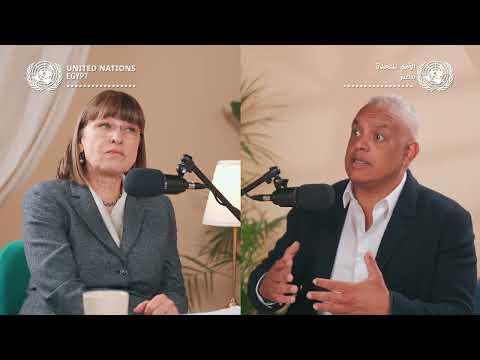
Story
12 August 2025
Panova: New National Youth and Sports Strategy Reflects Egypt’s Commitment to Sport as Driver of Development
The United Nations Resident Coordinator in Egypt, Elena Panova, said that the launch of the National Youth and Sports Strategy by Egypt’s Ministry of Youth and Sports reflects the government’s commitment to sport “as a cultural force and as a driver of national development, and as a catalyst for empowerment, inclusion, and opportunity.”The statement came during the launch of the National Youth and Sports Strategy (2025–2032) at a ceremony held in the New Administrative Capital under the patronage of Prime Minister Mostafa Madbouly, in partnership with the United Nations system in Egypt, and coinciding with the celebration of International Youth Day on August 12. During the event, Minister of Youth and Sports Dr. Ashraf Sobhy presented the new strategy, which aims to promote youth and sports development through investment in human capital, supporting smart economic contributions, and achieving sustainable development. In her address to an audience that included young participants; Minister of Education and Technical Education Mohamed Abdel Latif; Amal Ammar, President of the National Council for Women; UNFPA Representative in Egypt Yves Sassenrath; UNICEF Representative in Egypt Natalia Winder Rossi; and other representatives from ministries, UN agencies, and government entities, Panova said:“In Egypt, sport is a source of unity, identity, and ambition. Egypt’s new strategy embraces this reality. It positions sport both as a cultural force and as a driver of national development… This is a statement of intent that Egypt sees its young people, not only as the promise of tomorrow, but already as active contributors to the progress of today.” Noting that nearly 60% of Egypt’s population is under the age of 30, Panova said the country has “a huge demographic potential” and with it “a responsibility to ensure every young person has the chance to learn, to work, and to thrive… One powerful way to unlock that potential is through sport as a catalyst for empowerment, inclusion, and opportunity.”She highlighted that the strategy’s distinguishing feature is the way it was developed — through “a truly national conversation led by the Ministry of Youth and Sports: over 21 workshops in 11 cities, more than 10,000 young people surveyed, and over 400 concrete measures proposed.” “This is policy made with youth, not just for youth. It builds on the strong partnership between the United Nations and the Government of Egypt to make sure young people’s voices are not only heard but acted upon,” Panova said.She pointed to the UN’s belief that meaningful, diverse, and effective youth participation — inside the UN and beyond — is essential to achieving the Sustainable Development Goals. Panova referred to the Shabab Balad initiative, through which Egypt is part of the UN’s global Generation Unlimited movement to connect every young person to education, employment, and empowerment; and the UN in Egypt’s Youth Advisory Board, which ensures that young women and men contribute to shaping UN strategies, programmes, and decisions at every level. Panova said the UN’s priorities for youth — including skills development, decent work, civic engagement, and digital innovation — are closely aligned with Egypt’s national vision for its young people. She cited tangible results from joint work, noting that “in 2024 alone, more than 364,000 people — most of them young — gained new skills through UN-supported programmes.” She added that community coach initiatives are empowering young women to become local champions in sport and social innovation, while across Egypt, young entrepreneurs are leading green growth projects ranging from agribusiness to smart green ventures. Panova reaffirmed the UN’s commitment to working “for and with” young people, ensuring that collective actions are guided by their perspectives and energy. For his part, Yves Sassenrath, UNFPA Representative in Egypt, said: “Youth are not a side agenda; they are the agenda. UNFPA is proud to support Egypt’s new National Youth and Sports Strategy, shaped by more than 10,000 young voices—this is their platform for leadership. UNFPA is also proud to work hand in hand with the Government of Egypt in its efforts to ensure that every young woman and man has the skills, health, and rights that enable them to lead change.”UNICEF Representative in Egypt and Co-Chair of the UN Egypt Youth Taskforce, Natalia Winder Rossi, said: "Real change starts close to home—in classrooms, playgrounds, and communities where young people shape the future. Egypt’s new strategy puts youth at the heart of progress, and the UN stands with them every step of the way."The new strategy is built on four main pillars: the comprehensive development of youth and adolescents; promoting sport as a lifestyle; developing competitive sports and creativity; and improving governance in the youth and sports sectors.
1 of 5

Story
02 July 2025
UN's Panova says Egypt deeply committed to placing food systems, food security, and nutrition at heart of national development priorities
Elena Panova, the United Nations Resident Coordinator in Egypt, stated that the launch of the National Operational Plan for Food and Nutrition Systems 2025–2030 and the Roadmap to Accelerate Anemia Reduction in Egypt reflects the country's deep and sustained commitment to putting food systems, food security, and nutrition at the core of its human capital development agenda—and making them an essential component of its national development priorities.In a speech delivered on behalf of the United Nations Country Team in Egypt, Panova described the National Operational Plan as a transformational, evidence-based, multisectoral effort. She emphasized that transforming food systems and improving nutrition outcomes is a shared national endeavor requiring broad collaboration across sectors to maximize impact. Panova noted that the launch follows a series of major national strategies and investments, including Egypt’s National Food and Nutrition Strategy (2022–2030), the recently launched National Stunting and Malnutrition Prevention Program, the Takaful and Karama Program, the “First 1,000 Days” initiative, and the Egyptian Code of Marketing Breastmilk Substitutes and Baby-Friendly Health Facility accreditation. She called these programs “clear expressions of Egypt’s progress and ambition.”She described the Anemia Reduction Roadmap as a wise investment for Egypt, noting that every $1 invested in reducing anemia could generate up to $12 in economic returns. The roadmap, she added, will improve the health of pregnant women and their children and could also enhance academic performance among students.“We view both the National Operational Plan for Food and Nutrition Systems and the Roadmap to Accelerate Anemia Reduction not only as means to improve food and nutrition security but as levers for broader social and economic outcomes,” Panova said. "Economic prosperity, social cohesion, and national resilience begin with a food ecosystem that is not only nutrition-sensitive but also addresses inequities and reduces gaps by reaching the most vulnerable population groups, including women, children, the elderly, and others,” she added.Panova presented four critical enablers to ensure the successful implementation of the plan:Strong multisectoral coordination mechanisms to ensure alignment and convergence across all sectors and systems—health, agriculture, education, and social protection.Robust accountability and monitoring frameworks to track progress, promote transparency, and drive continuous improvement.Investment in data systems and evidence generation, enabling timely and informed policy decisions and effective scaling of successful approaches.Sustainable financing and capacity development, ensuring national ownership and long-term resilience of systems.In conclusion, Panova affirmed the United Nations’ strong commitment to supporting these enablers—whether through technical assistance, policy guidance, institutional capacity building, or innovation and knowledge exchange.
1 of 5
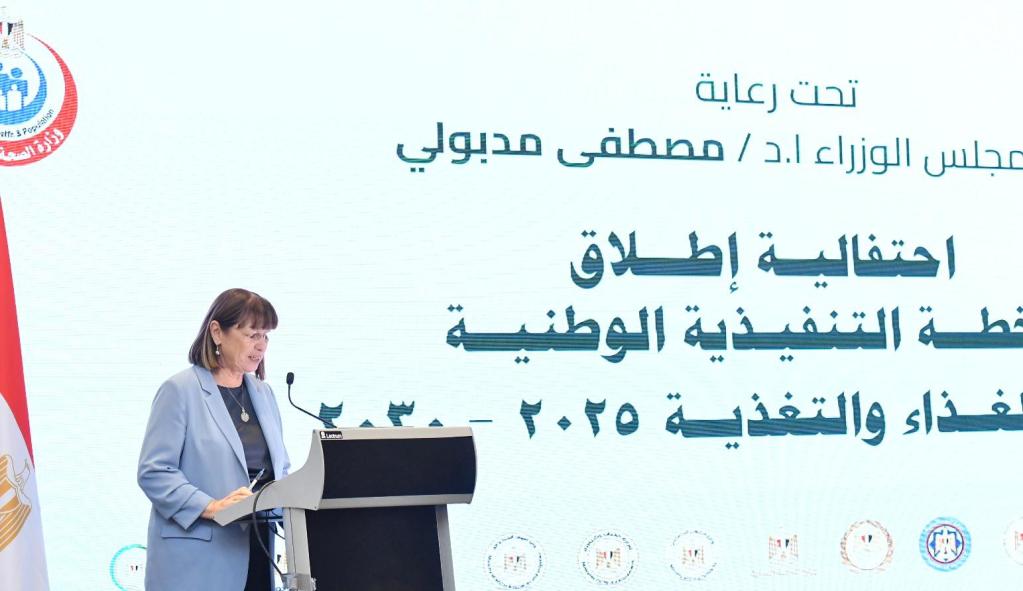
Story
01 July 2025
Eighty years on, UN Charter marked by reflection, resolve – and a run
It wasn’t an average Thursday morning in Manhattan. In the early hours, UN diplomats (and UN News) hit the streets in their sneakers – from Times Square to East River – following a route that traced the shape of “UN@80”. Inside the General Assembly Hall, delegates gathered to commemorate the 80th anniversary of its signing.They reflected on the past eight decades in which the UN helped rebuild countries after the Second World War, supported former colonies’ independence, fostered peace, delivered aid, advanced human rights and development, and tackling emerging threats like climate change.To save succeeding generations from the scourge of warGeneral Assembly President Philémon Yang described the moment as “symbolic” but somber, noting ongoing conflicts in Gaza, Ukraine and Sudan, and the growing challenges to multilateralism.He urged nations to choose diplomacy over force and uphold the Charter’s vision of peace and human dignity: “We must seize the moment and choose dialogue and diplomacy instead of destructive wars.”Secretary-General António Guterres echoed this call, warning that the Charter’s principles are increasingly under threat and must be defended as the bedrock of international relations.“The Charter of the United Nations is not optional. It is not an à la carte menu. It is the bedrock of international relations,” he said, stressing the need to recommit to its promises “for peace, for justice, for progress, for we the peoples.”Carolyn Rodrigues-Birkett, Security Council President for June, emphasized the urgency of renewed collective action to address emerging global threats.“Let this 80th anniversary of the Charter be not just an occasion for reflection, but also a call to action,” she urged.UN Photo/Loey FelipeGeneral Assembly commemorates 80th anniversary of the signing of UN Charter.To unite our strength to maintain international peace and securityEighty years ago, on 26 June 1945, delegates from 50 countries gathered in San Francisco to sign a document that would change the course of history.Forged in the aftermath of the Second World War, by a generation scarred by the Great Depression and the Holocaust and having learnt the painful lessons of the League of Nations’ collapse, the Charter of the United Nations represented a new global pact.Its preamble – “We the peoples of the United Nations” – echoed the determination to prevent future conflict, reaffirm faith in human rights, and promote peace and social progress.That very document, preserved by the United States National Archives and Records Administration, has returned – for the first time in decades – to the heart of the institution it founded.Now on public display at UN Headquarters through September, the original Charter stands as a powerful symbol: not just of a past promise, but of an enduring commitment to multilateralism, peace and shared purpose. Video: UN Charter returns to UN HeadquartersTo promote social progress and better standards of lifeMore voices – from the presidents of the Economic and Social Council (ECOSOC) and the International Court of Justice (ICJ) – also took the floor, reaffirming the enduring relevance of the Charter and the need to defend it.Bob Rae, ECOSOC President, drew an arc through human history to underscore the UN’s relative youth – just eight decades old in a global context of millennia.“We currently have the advantage of being able to lucidly look at what we have accomplished, while also recognizing our successes and failures,” he said, holding up a copy of the Charter once used by his father.“The United Nations is not a government and the Charter is not perfect,” he said, “but it was founded with great aspirations and hope.”ICJ President Judge Yuji Iwasawa reflected on the progress since 1945 and the challenges still facing the global community.“In the 80 years since the drafters of the Charter set down their pens, the international community has achieved remarkable progress. However, it also faces many challenges,” he said. “The vision of the Charter’s drafters to uphold the rule of law for the maintenance of international peace and security, remains not only relevant but indispensable today.”UN Photo/Loey FelipeJordan Sanchez, a young poet, speaks at the General Assembly during the commemoration of the 80th anniversary of the signing of the UN Charter.To reaffirm faith in fundamental human rightsIn a powerful reminder that the Charter speaks not only to the past but to future generations, Jordan Sanchez, a young poet took the stage.Her spoken word piece, Let the Light Fall, evoked not declarations, but feelings of hope and vision for a better world.“Let the light fall,” she began, “on fallen faces hidden in the shadow of scorn…where may the children run towards the light of your face, towards the warmth of your presence and the stillness of your peace.”“There is no fear, only abundance, of safety, of security, of knowing there will always be enough light for me” she said, describing a dreamscape of Eden restored – not a paradise lost, but glimpsed in justice, fairness and shared humanity.“Let us be bold enough to look down and take it, humble enough to kneel down and bathe in it, loving enough to collect and share it, and childish enough to truly, truly believe in it.”The equal rights of men and womenAs the world marks 80 years of the UN Charter, it’s worth remembering that its promise of equal rights for men and women was hard-won from the very start.In 1945, just four women were among the 850 delegates who gathered in San Francisco to sign the document, and only 30 of the represented countries granted women the right to vote.In a 2018 UN News podcast, researchers spotlighted these overlooked trailblazers – and asked why the women who helped shape the UN’s founding vision are so often left out of its story.
1 of 5
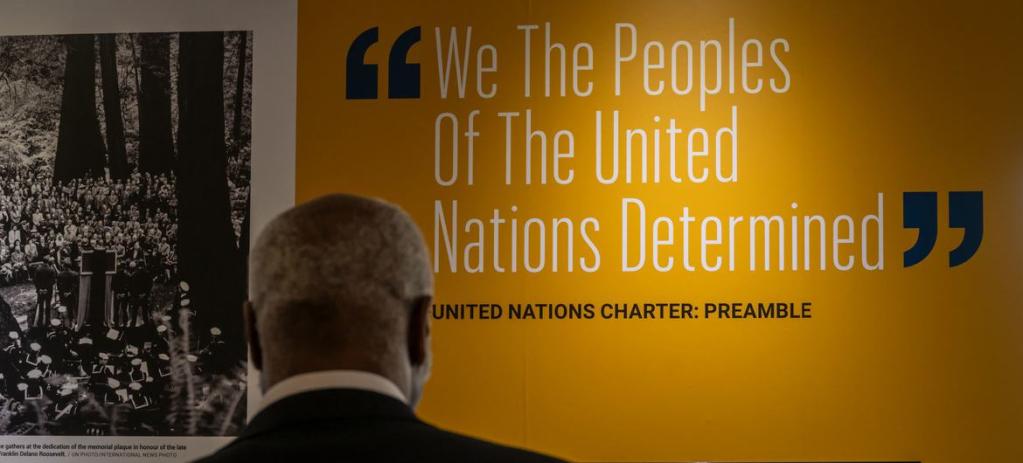
Story
29 May 2025
Standing Between Conflict and Hope: Time to Equip UN Peacekeepers for Tomorrow's Challenges
Joint Op-ed by Ambassador Khaled El Bakly, Assistant Minister for Foreign Affairs for Multilateral & International Security Affairs Elena Panova, UN Egypt Resident Coordinator As the United Nations marks its 80th anniversary, the legacy of UN peacekeeping stands as one of the clearest and most enduring expressions of multilateral cooperation. For nearly eight decades, the service and sacrifice of Blue Helmets have saved and changed lives—helping countries navigate the difficult path from war to peace.From Cyprus to Lebanon, and from the Central African Republic to South Sudan and the Democratic Republic of the Congo, more than 76,000 civilian, military, and police personnel currently serve in 11 missions around the world. These men and women offer a lifeline to millions living in some of the world’s most fragile political and security environments.In light of these growing pressures, it is essential to rethink the role of peacekeeping within the broader international peace and security architecture. As President Abdel Fattah Al-Sisi has rightly asserted “peacekeeping—while a vital tool of the international community—should not be viewed as the sole means of maintaining peace”. H.E further emphasized that “it cannot substitute preventive diplomacy, mediation, peacebuilding, or the political, economic, and social measures necessary to address root causes and mend societal fractures”, underscoring that “peacekeeping must not become the default or immediate response to every crisis”.This year’s International Day of UN Peacekeepers is observed under the theme “The Future of Peacekeeping”—a theme that could not be more timely or relevant. Peacekeeping today faces mounting and unprecedented challenges. Conflicts are growing longer, deadlier, and more complex. They increasingly spill across borders and are exacerbated by terrorism, organized crime, cyber warfare, disinformation, and the weaponization of technology. Climate change, meanwhile, deepens instability in already-vulnerable regions. And divergent views within the UN Security Council have made consensus more elusive — slowing the pace of action, precisely when urgency is most needed.As UN Secretary-General António Guterres bluntly put it: “Trust is in short supply among—and within—countries and regions… This is a grim diagnosis, but we must face facts.” Among the most urgent issues is the growing and persistent mismatch between what peacekeeping missions are asked to achieve and the resources that are not available to do so. This undermines effectiveness and places peacekeepers in situations “where there is little or no peace to keep”.The Pact for the Future, adopted at the 2024 Summit of the Future, offers a moment of reckoning—and opportunity. It affirms that peace operations can only succeed when backed by political will and accompanied by inclusive strategies that address the root causes of conflict. It rightly emphasizes the need for peacekeeping missions to be supported by predictable, adequate, and sustained financing.The Pact also mandates a comprehensive review of UN peace operations—a chance to rethink and reform the peacekeeping model. Today’s high-risk environments demand that missions be equipped with the right tools, partnerships, and strategies to protect civilians and support peacebuilding effectively.Egypt, through its 65 years of active participation in United Nations peacekeeping has long demonstrated a strong, sustained and unwavering commitment to the purposes and principles of the United Nations Charter. Since it first deployed troops to the UN Operation in the Congo in 1960, Egypt has contributed over 30,000 of its sons and daughters to 37 missions across 24 countries and has consistently remained one of the top contributors of uniformed personnel to UN peacekeeping. Egypt currently has 1205 peacekeepers, including women, serving across five missions in AfricaEgypt’s longstanding record of service and sacrifice in peacekeeping is globally recognized. This is reflected in its re-election as Rapporteur of the UN Special Committee on Peacekeeping Operations, its recent election to the UN Peacebuilding Commission, and its appointment as co-facilitator for the upcoming 2025 Peacebuilding Architecture Review in both the General Assembly and the Security Council.Egypt’s leadership in peacekeeping is not limited to troop contributions. It plays an active role in shaping strategic thinking around reform. Through the Cairo International Center for Conflict Resolution, Peacekeeping and Peacebuilding (CCCPA)—an African Union Center of Excellence. Egypt has championed context-sensitive, innovative, and inclusive peace operations. The CCCPA emphasizes prevention, civilian protection, and regional partnerships while strengthening the participation of women in peacekeeping, in line with the Women, Peace and Security agenda. Through the CCCPA annual Aswan Forum, Egypt further promotes African-led solutions and stronger peacekeeping–peacebuilding synergies. This work, carried out in close cooperation with the UN in Egypt, is a prime example of effective South-South cooperation and the value of locally driven solutions. Egypt also actively contributes to training African and international uniformed peacekeepers through specialized facilities operated by the Ministry of Interior via the Egyptian Center for Peacekeeping Operations, and by the Ministry of Defense through its Liaison Agency with International Organizations (LAWIO).Egypt is also a staunch supporter of the UN Secretary-General’s Action for Peacekeeping (A4P) initiative. In 2018, Egypt convened a landmark high-level international conference aimed at improving peacekeeping effectiveness. The event led to the “Cairo Roadmap for Peacekeeping Operations,” a concrete framework of shared commitments that was later endorsed by the African Union in 2020. This year, as we remember the 4,430 peacekeepers who have given their lives in the pursuit of peace, we must go beyond commemoration by upholding the principles for which they paid the ultimate sacrifice. Over 60 Egyptian peacekeepers have sacrificed their lives while serving as part of UN operations across the globe. Their sacrifice is a sobering reminder of the growing risks peacekeepers face, and our collective duty to ensure they are provided with the necessary means to fulfill their mandates.At the recently concluded 2025 UN Peacekeeping Ministerial in Berlin this May, Egypt reaffirmed its strong commitment to advancing UN peacekeeping through planned deployments, the preparation of well-trained officers, and expanded training efforts. It pledged to provide specialized capabilities, deploy qualified personnel to UN missions, and enhance training in coordination with international partners. Egypt also highlighted the importance of integrating technology, drawing on lessons from regional transitions, and promoting gender parity—underscoring its intention to surpass the UN’s targets for women's participation in uniformed roles.As the United Nations continues to face significant challenges and in the context of a region affected by multiple conflicts, Egypt has stood firm as a staunch and reliable partner to global peace and security. Furthermore, Egypt has expressed its readiness to provide all necessary support for the UN80 initiative this year in order to help make it a success to achieve effectiveness and rationalization to help meet the acute financial challenges faced by the United Nations and peacekeeping. In that regard, Egypt’s readiness and preparedness to host United Nations’ agencies, programs and offices that might be up for relocation as per the UN80 initiative is to be highly commended. Egypt’s strategic location—at the crossroads of Africa, Asia, Europe, and the Middle East—positions it as a natural hub for connectivity and cooperation. Its central time zone and proximity to key regions make it an ideal and cost-effective location, reducing travel time and facilitating seamless coordination. With direct access to both the Red Sea and the Mediterranean through the Suez Canal - a vital artery of global trade - Egypt offers unmatched maritime connectivity. It’s highly connected international airports and geographical proximity to conflict zones further enhances its relevance as a center for diplomacy, crisis response and peacekeeping efforts.Egypt’s vast experience with peacekeeping and related provision of humanitarian assistance are certainly also worth highlighting as advantageous. As host to multiple international and regional organizations and offices including the seat of the League of Arab States and with over 140 represented embassies in Cairo, Egypt remains a geo-political hub with an already strong United Nations’ presence, a modern infrastructure, and well-recognized levels of safety. As the Secretary-General has said: “Now more than ever, the world needs the United Nations—and the United Nations needs peacekeeping that is fully equipped for today’s realities and tomorrow’s challenges.” Peacekeeping missions are under strain. However, with renewed multilateral resolve, adequate resourcing, and bold reforms, we can empower UN peacekeepers to remain a vital force for peace, stability, and hope in a troubled world, and Egypt, in cooperation with the United Nations remains at the forefront of nations providing such support.
1 of 5
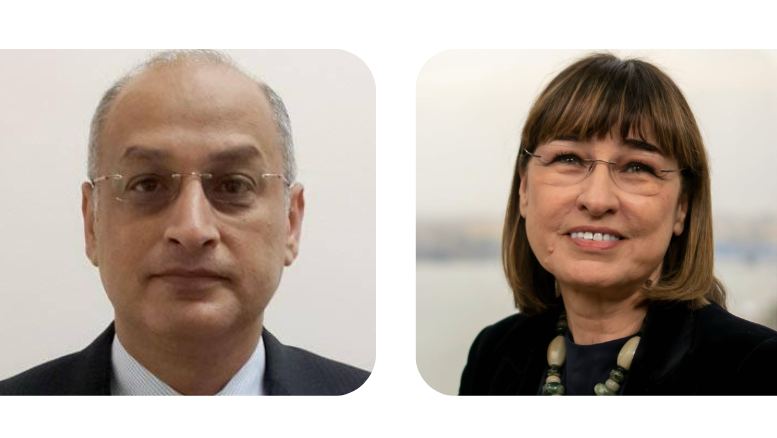
Story
23 May 2025
Reimagining Development in a Complex World: UN Egypt retreat mulls new strategies and partnerships to advance national priorities and the SDGs
Cairo - Against the backdrop of rapidly changing global and regional landscape—marked by socio-economic uncertainty and a redefined approach to financing for development—representatives from across the United Nations system in Egypt convened for their annual UN Country Team (UNCT) retreat. The gathering served as a critical moment for reflection and renewed commitment to advancing national priorities and accelerating progress on the Sustainable Development Goals (SDGs). Over the course of two days, participants engaged in a series of strategic discussions focused on the changing global and regional socio-economic, political, and security landscape and its implications for UN operations in Egypt. The sessions offered an opportunity to reassess current approaches and explore new strategies for delivering on the UN Sustainable Development Cooperation Framework (UNSDCF)—the central instrument guiding the UN’s development work in Egypt – and supporting Egypt to progress further on the human rights agenda. Taking place only weeks ahead of the 4th International Conference on Financing for Development (FFD4), in Sevilla, Spain, the sessions included a high-level intervention, by Mahmoud Mohieldin, UN Special Envoy on Financing the 2030 Agenda for Sustainable Development, who spoke about the global shifts and emerging trends in the development financing landscape and their impact on Egypt’s sustainable development trajectory. While acknowledging existing challenges for Egypt that require a new comprehensive approach for development, Mohieldin also highlighted key advantages for the country when it comes to localization, digitalization and data, along with the potential to benefit from the demographic dividend, encouraging all stakeholders to invest more in human capital as well as in digital infrastructure, in partnership with the private sector. The discussions also underscored the UN’s role in supporting the implementation of Egypt’s Integrated National Financing Framework (INFF), a key tool for mobilizing and aligning resources with national priorities. Deepening engagement with top UNSDCF partners was also on top of the meeting’s agenda, with a high-level discussion including the Ambassadors of Germany, The Netherlands, Norway and Canada, along with EU Head of Development Cooperation and USAID Country Director for Egypt – weighing on the repercussions of the announced Official Development Assistance (ODA) cuts and shifting partner’s priorities globally and in Egypt. The session further reflected on the evolving development cooperation landscape and discussed ways to enhance collective impact. Furthermore, the retreat featured a high-level exchange with H.E. Ambassador Osama Abdelkhalek, Egypt’s Permanent Representative to the United Nations, who shared valuable insights into Egypt’s global engagement priorities and opportunities for strengthened collaboration with the UN system, including on the UN80 initiative.The UN Country Team also took time to reflect internally on how to adapt its coordination and partnership strategies in response to these shifting dynamics. This included a review of UN positioning on key country transitions that highlighted the need to put youth at the center of UN programming and advocated for expanded dialogue with the private sector. Throughout the retreat, the Resident Coordinator’s Office (RCO) played a central role in facilitating strategic dialogue and coordination, highlighting the RC system’s ability to convene diverse actors and improve the effectiveness of the UN’s country-level work.“The challenges are immense, but only with our collective ability to lead and come together around key national priorities can we deliver for the people we serve. We will continue to mobilize the UN system and leverage our convening power and work hand in hand with our development partners to support the government of Egypt in its journey to deliver for its people. Our commitment remains clear: to ensure that no one is left behind,” said the UN Resident Coordinator in Egypt, Elena Panova.
1 of 5
Press Release
25 November 2025
The Secretary-General -- Message on The International Day For The Elimination Of Violence Against Women 25 November 2025
That is why online protection is the focus of this year’s International Day for the Elimination of Violence Against Women.Online harassment, deepfakes and hate speech are proliferating.Misogynistic content is moving from the margins to the mainstream.And violence that begins in the digital world can spill over into the physical –– in the form of stalking, abuse, even femicide.Ending this crisis demands action from us all:Governments must criminalize digital violence and strengthen support for survivors. Technology companies must ensure their platforms are safe and accountable.And communities must come together in zero tolerance for online hate. We cannot allow digital spaces to be yet another place where women and girls are unsafe.On the 30th anniversary of the Beijing Declaration, I call on the world to unite to end violence against women everywhere. Together, we can build a world free of fear where every woman and every girl can thrive. ***
1 of 5
Press Release
20 November 2025
THE SECRETARY-GENERAL -- VIDEO MESSAGE ON WORLD CHILDREN’S DAY 20 November 2025
Signed 36 years ago today, it affirms a simple truth: When we protect the youngest members of the human family, we build a better world.But right now, children’s rights are under attack.Poverty and emergencies are stealing education. Climate chaos is jeopardizing futures. And new dangers lurk in the online world.Too many children already carry burdens far beyond their years, earning income or caring for siblings.And famine and war have robbed thousands of the most basic right of all: The right to life. Every child’s circumstances are unique.But every child has the same rights, no matter who they are or where they live.This World Children’s Day, let us listen to children. And let us amplify their voices as they stand up for their rights.The future is defined by how we care for the next generation.We must unite to build a safe and equal world for every child.***
1 of 5
Press Release
25 October 2025
UN Convention against Cybercrime opens for signature in Hanoi, Viet Nam
The world’s first global convention to prevent and respond to cybercrime opened for signature today in Hanoi, Viet Nam.65 states signed the UN Convention against Cybercrime, which still must be ratified by each State according to its own procedures. “The UN Cybercrime Convention is a powerful, legally binding instrument to strengthen our collective defences against cybercrime,” noted UN Secretary-General António Guterres at the signing ceremony. “It is a testament to the continued power of multilateralism to deliver solutions. And it is a vow that no country, no matter their level of development, will be left defenceless against cybercrime.”The Convention against Cybercrime seeks to respond to the growing threat posed by cybercrime, acknowledging that the misuse of information and communications technology is enabling crimes like terrorism, human trafficking, financial crimes and drug smuggling on an unprecedented scale. It aims to make the prevention and response to cybercrime more effective by strengthening international cooperation, technical assistance and capacity building, particularly for developing countries.Some highlights of the Convention: It is the first global framework for the collection, sharing and use of electronic evidence for all serious offences. Until now, there have been no broadly accepted international standards on electronic evidence;It is the first global treaty to criminalize cyber-dependent crimes and also offences related to online fraud, online child sexual abuse and exploitation material and online grooming of children;It is the first international treaty ever to recognize the non-consensual dissemination of intimate images as an offence;It creates the first global 24/7 Network where countries can quickly initiate cooperation; andIt recognizes and promotes the need to build capacity in countries to pursue and cooperate on fast-moving cybercrimes. “Cybercrime is changing the face of organized crime as we know it, and the new UN Cybercrime Convention provides Member States with a vital tool to fight back together,” said UNODC Executive Director Ghada Waly. “The signing of the Convention highlights the enduring value of multilateral cooperation after five years of negotiations. I am proud of the role UNODC has played in this achievement, and deeply grateful to Viet Nam for its leadership in hosting the signing ceremony. Now we must ensure the Convention’s swift entry into force and implementation, for a safer digital world for all.”The UN Convention against Cybercrime was adopted by the UN General Assembly in December 2024. It will enter into force 90 days after being ratified by the 40th signatory. *****For further information, please contact:Sonya Yee
Chief, UNODC Advocacy Section
Mobile: (+43-699) 1459-4990
Email: unodc-press[at]un.org* *** *
Chief, UNODC Advocacy Section
Mobile: (+43-699) 1459-4990
Email: unodc-press[at]un.org* *** *
1 of 5
Press Release
24 October 2025
THE SECRETARY-GENERAL -- MESSAGE FOR UNITED NATIONS DAY 24 October 2025
The United Nations is more than an institution. It is a living promise – spanning borders, bridging continents, inspiring generations. For eighty years, we have worked to forge peace, tackle poverty and hunger, advance human rights, and build a more sustainable world – together. As we look ahead, we confront challenges of staggering scale: escalating conflicts, climate chaos, runaway technologies, and threats to the very fabric of our institution. This is no time for timidity or retreat. Now, more than ever, the world must recommit to solving problems no nation can solve alone. On this UN Day, let’s stand together and fulfil the extraordinary promise of your United Nations. Let’s show the world what is possible when “we the peoples” choose to act as one. ***
1 of 5
Press Release
23 October 2025
El Gouna Film Festival, UN World Food Programme, and Zest Announce the Winner of the “Eish” Short Film Competition
In a meaningful collaboration with WFP in Egypt and Zest, and under the festival’s enduring slogan “Cinema for Humanity,” the “Eish” initiative returned this year, embodying the true essence of that motto. The word “Eish” in Arabic, meaning both “bread” and “life,” reflects the idea that bread is not merely food, it is a symbol of existence itself. Launched for the first time in 2024 through a collaboration between GFF, WFP Egypt, and Zest, the “Eish” initiative returned in its second edition as an open call for filmmakers from Egypt and the Arab world to explore the concept of food security through film. Competing films of the 2025 Eish competition were reviewed by a distinguished jury composed of film producer Safei Eldin Mahmoud, Ayten Amin, film director and writer, and Ahmed Magdy, actor and producer. Based on a careful selection process the winner was announced at an exclusive event held during the festival, with a production award for the film concept to be produced throughout the following year. As part of the event, supported by El Gouna City, a special trailer of the 2024 Eish competition winning film, Khufu, was shown. Directed by Mahmoud Khaled El Assy, the story is a moving portrayal of resilience and family bonds amid the declining health of their camel, their only source of income near the Giza Pyramids. The opening of this year’s festival coincides with World Food Day, a meaningful alignment that reaffirms cinema’s ability to serve as a platform for advocacy. On this occasion, Marianne Khoury, Artistic Director of El Gouna Film Festival, stated: “We launch the second edition of ‘Eish’ not merely as a competition, but as an open window onto a reality that needs to be told, and voices that await to be heard. What we believe in at El Gouna, and what unites us with the World Food Programme and Zest, is the conviction that cinema is not a visual luxury, but a force capable of disrupting silence, of turning food insecurity into a story.” Jean-Pierre de Margerie, WFP Representative and Country Director in Egypt, added: "The 'Eish' Short Film Competition is a creative initiative and a platform that brings the human face of food security into focus. Through our initiative with El Gouna Film Festival, and Zest, we are proud to support a space where filmmakers can explore the deep connection between food, dignity, and resilience. As we celebrate the winning film, we are reminded that storytelling has the power not only to raise awareness, but to inspire action."Abdallah Dnewar, Head of Zest Specials, stated, “At Zest, we believe that food is at the center of everything in so many ways, and that food can be a powerful medium for storytelling and communicating powerful emotions, memories, and struggles. The Eish initiative is the outlet through which we tell food-centric stories through the lens of cinema. In partnership with the World Food Programme, food security takes center stage. Hosted at the prestigious Gouna Film Festival, a partner in this journey, we’re proud to showcase art that inspires action. This year, we continue our tradition by giving another artist the platform to debut their vision and revisiting last year’s winning film, Khufu.”
1 of 5
Latest Resources
1 / 11
1 / 11

